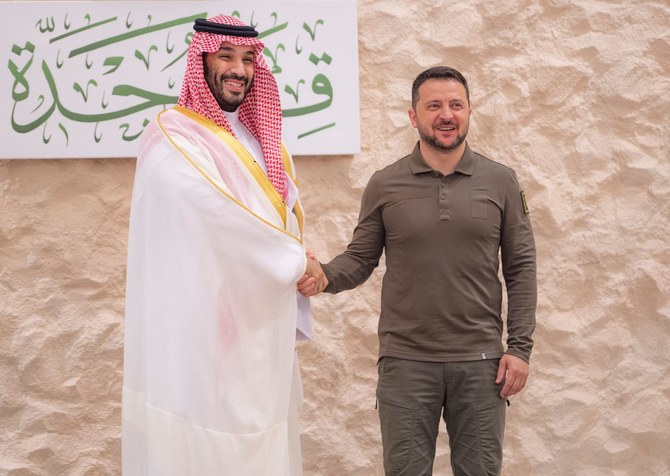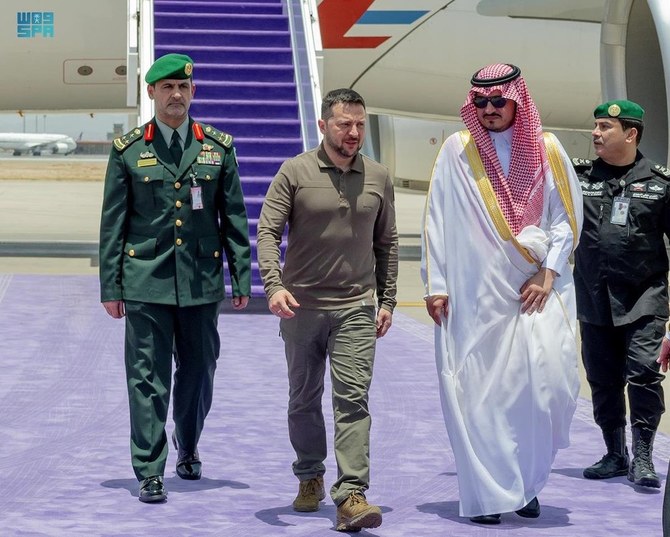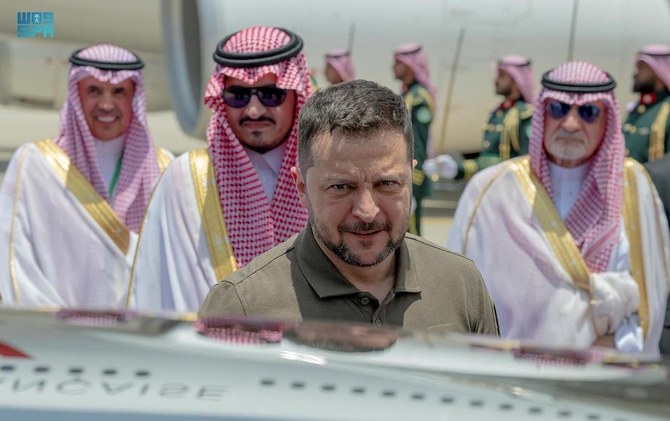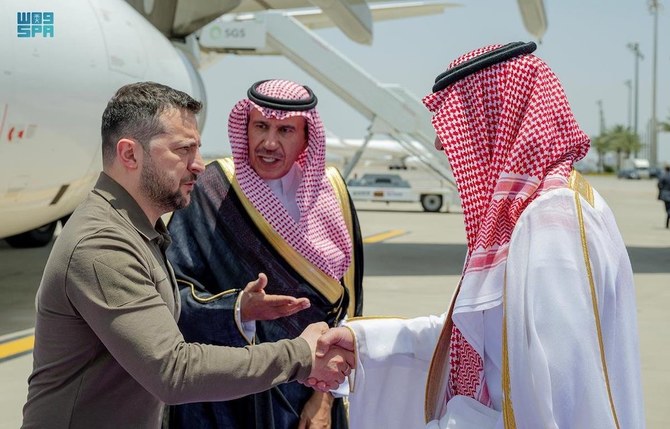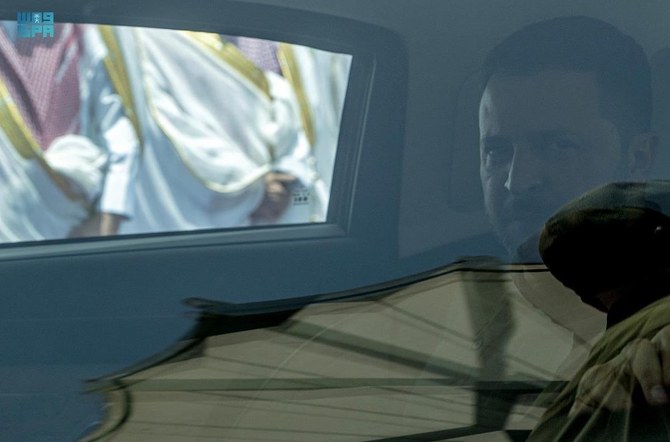JEDDAH: Ukrainian president Volodymyr Zelensky was in Saudi Arabia for the 32nd Arab League summit being hosted by the Kingdom on Friday, ahead of an expected trip to Japan for a G7 meeting.
Zelensky was welcomed by Saudi dignitaries as he stepped off the French government aircraft that flew him from Poland.
“Beginning my first-ever visit to the Kingdom of Saudi Arabia to enhance bilateral relations and Ukraine’s ties with the Arab world. Political prisoners in Crimea and temporarily occupied territories, the return of our people, Peace Formula, energy cooperation. KSA plays a significant role and we are ready to take our cooperation to a new level,” Zelensky posted on his Twitter account.
In an address to the summit, Zelensky urged more support for his people.
“I am sure we can all be united in saving people from the cages of Russian prisons,” he said, speaking in English.
“We will not submit to any foreign country or colonizers. Our goal is to protect the Ukrainian people. Ukraine did not choose war and did not engage in any hostilities inside the territory of other countries,” he continued.
“What is happening in our country is a war, not just a conflict, Ukraine is forced to continue fighting.
“We do not possess the missiles that the enemy possesses, and we do not have air capabilities equal to the capabilities of the enemy, but we remain strong because we know that the truth is on our side.
“We are trying to push the invaders from our land, anyone who defends his land and protects his children from enslavement, such a warrior is on the path of justice, and I am proud to say that I represent these warriors and fighters and all the Ukrainian people,” he added.
The Ukrainian leader met with Saudi Crown Prince Mohammed bin Salman. Crown Prince Mohammed Bin Salman has mediated in the Russia-Ukraine conflict before, especially with the release of prisoners of war last year, including 10 foreigners captured by Russia in Ukraine.
“The Kingdom of Saudi Arabia plays a significant role and we are ready to take our cooperation to a new level,” Zelensky said wrote on Twitter shortly after arriving in Jeddah.
Zelensky thanked the crown prince for backing Ukraine's sovereignty, a statement from the presidency said.
“The President thanked the Crown Prince of Saudi Arabia for supporting the territorial integrity and sovereignty of Ukraine,” Zelensky's office said, adding that he had invited the crown prince to visit Ukraine.
Beginning my first-ever visit to the Kingdom of Saudi Arabia to enhance bilateral relations and Ukraine’s ties with the Arab world. Political prisoners in Crimea and temporarily occupied territories, the return of our people, Peace Formula, energy cooperation. KSA plays a…
— Володимир Зеленський (@ZelenskyyUa) May 19, 2023
Saudi Arabia’s foreign ministry, in a post on social media, welcomed the Ukrainian leader as guest of the Arab League’s 32nd regular session.
#جدة | أهلاً بكم فخامة الرئيس فلاديمير زيلينسكي رئيس أوكرانيا ضيفًا للدورة العادية الـ32 في #قمة_جدة pic.twitter.com/H0C4IDZvzq
— وزارة الخارجية (@KSAMOFA) May 19, 2023
Anatolii Petrenko, Ukraine’s ambassador to Saudi Arabia, meanwhile said Zelensky’s visit was a milestone for Ukrainian-Arab relations.
The envoy added that the “Global South and Ukraine are consistently building up their ties while consolidating efforts to effectively tackle the critical issues of global and regional significance” in a post on social media.
Today is truly a Milestone Day for Ukrainian-Arab relations! Ukrainian President Volodymyr Zelenskyy @ZelenskyyUa arrived in Jeddah to participate in the Arab League Summit. First visit to hospitable Saudi Arabia and first Ukrainian leader to take part in such an event of…
— Anatolii Petrenko (@AmbUkraineKSA) May 19, 2023
Zelensky also met with Iraq’s Prime Minister Al-Sudani, who he thanked for “Iraq’s solidarity” and its “firm position in supporting the sovereignty and territorial integrity of our state.”
Zelensky also held talks with the heads of the delegations from the UAE, Oman and Kuwait, with whom he discussed Ukraine’s peace formula. The formula refers to Zelensky’s peace plan, which includes the full withdrawal of Russian troops and the restoration of Ukraine’s state borders.
The Ukrainian leader discussed issues relating to trade and investment as well as “global food security and the work of the Black Sea Grain Initiative” with the UAE delegation head.
He “emphasized the importance of supporting Ukraine’s peaceful efforts by the countries of the region” in discussions with Oman’s Asaad bin Tarik Al-Said.
Zelensky also “expressed gratitude to Kuwait for its consistent support... repeatedly confirmed in the course of voting for the relevant resolutions of the UN General Assembly.”
* With AFP and Reuters


